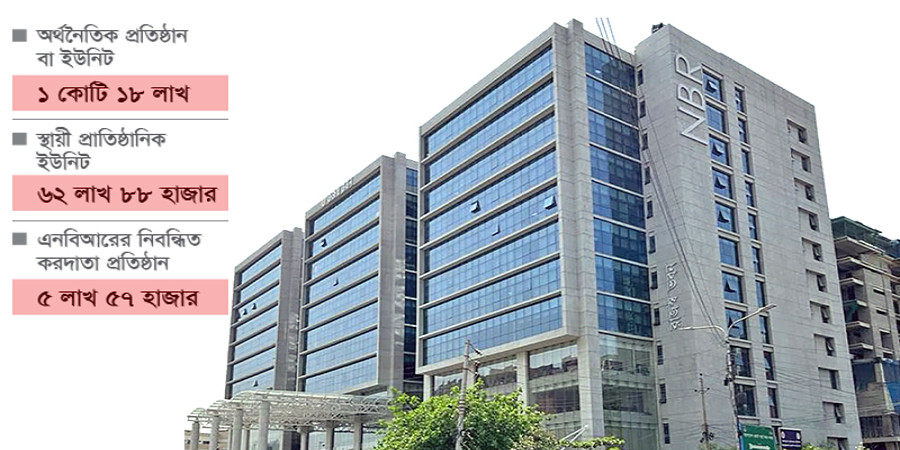
ছবি: Photo: Collected
Bangladesh's economy has expanded significantly, with the total number of economic units surpassing 11.8 million. Among them, 6.28 million are permanent institutional units. However, despite this growth, tax compliance remains alarmingly low. According to the National Board of Revenue (NBR), only 557,000 businesses have registered for VAT, leaving over 90% of institutional units outside the tax net.
Experts attribute this to structural weaknesses in the revenue system, which hinder tax collection. The inefficiency in tax administration results in a significant portion of economic units operating outside the formal tax structure. This issue has contributed to Bangladesh’s status as one of the countries with the lowest tax-to-GDP ratios globally. Even compared to regional neighbors such as Nepal and Pakistan, Bangladesh lags behind, struggling to push the ratio beyond 7-8%.
The Bangladesh Bureau of Statistics (BBS) recently released data indicating that 3.9 million permanent economic units operate in rural areas, while 2.3 million are in urban centers. Yet, VAT registration remains disproportionately low. Under the current VAT regulations, businesses with an annual turnover below 3 million BDT are exempt from VAT. Those with turnovers between 3 million and 5 million BDT pay a reduced 3% VAT, while businesses exceeding 5 million BDT are subject to a 15% VAT rate.
One sector exemplifying the lack of tax compliance is the jewelry industry. Despite around 40,000 jewelry businesses operating across Bangladesh, only 8,000 have VAT registration, and just 1,000 have installed Electronic Fiscal Devices (EFDs). To address this, NBR recently urged the Bangladesh Jewelry Association (BAJUS) to ensure that all its members register for VAT. Officials have set February and March as key months to bring more businesses under the VAT registration framework.
Economists emphasize that the primary challenge lies in NBR’s institutional capacity. They argue that greater use of automation and technology can enhance efficiency. Fahmida Khatun, Executive Director of the Center for Policy Dialogue (CPD), suggests linking business identification numbers (BIN) with bank accounts to streamline tax collection. Automation would enable tax authorities to monitor returns without needing physical inspections.
Despite attempts to increase VAT compliance, resistance from business owners persists. Former NBR member Rezaul Hasan recalls past initiatives that failed due to opposition from trade bodies. Efforts to impose VAT on goldsmiths based on their stored gold met with industry-wide strikes, forcing authorities to reconsider their approach.
The lack of comprehensive VAT registration highlights broader challenges in Bangladesh’s tax system. Business leaders argue that instead of expanding the tax net, authorities often resort to raising commercial taxes, which places undue burdens on existing taxpayers. Mohammad Hatem, President of the Bangladesh Knitwear Manufacturers and Exporters Association (BKMEA), notes that corporate tax rates can exceed the stated 12% due to additional advance taxes, sometimes reaching 50-60%.
Another factor complicating tax collection is the overestimation of Bangladesh’s GDP figures. The BBS initially estimated GDP for the 2023-24 fiscal year at $459 billion but later revised it to $450 billion. Some economists argue that even this figure is inflated by at least $100 billion, distorting tax-to-GDP calculations.
The prevalence of informal economic activities further exacerbates tax evasion. According to the 2022 Labor Force Survey, 84% of Bangladesh’s workforce operates in the informal sector, with agriculture accounting for 45% of informal employment, followed by industry at 38% and services at 17%. The dominance of informal employment means that a significant portion of economic activity remains outside the tax system.
To address these issues, policymakers stress the need for automation in tax administration. Former NBR officials suggest that increasing reliance on digital tools will reduce the need for physical inspections and improve compliance rates. NBR has also initiated crackdowns on sectors notorious for tax evasion, such as the tobacco industry, which contributes 25% of VAT revenue but faces significant illegal trade issues.
However, NBR officials contend that not all of the economic units identified by BBS are eligible for VAT registration. They argue that most producers, importers, and exporters are already registered, while many small-scale traders and service providers remain outside the system due to local trade associations resisting tax enforcement efforts.
Ultimately, addressing Bangladesh’s low tax compliance requires a multifaceted approach. Strengthening NBR’s institutional capacity, leveraging technology for automated tax collection, and tackling GDP overestimation are all crucial steps. Without these reforms, the country risks continued reliance on a narrow tax base, hindering sustainable economic growth.
repoter






